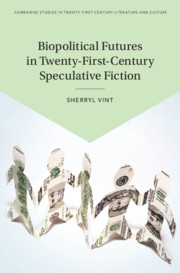Book contents
- Biopolitical Futures in Twenty-First-Century Speculative Fiction
- Cambridge Studies in Twenty-First-Century Literature and Culture
- Biopolitical Futures in Twenty-First-Century Speculative Fiction
- Copyright page
- Contents
- Acknowledgments
- Introduction
- Chapter 1 Suspending Death, Reinventing Life
- Chapter 2 The New Flesh
- Chapter 3 Capital Reproduction
- Chapter 4 Surplus Value
- Chapter 5 Life Industries
- Chapter 6 Living to Work
- Chapter 7 Life Optimized
- Chapter 8 Surplus Vitality and Posthuman Possibilities
- Conclusion
- Notes
- Bibliography
- Index
Chapter 4 - Surplus Value
Transplantation and Fungible Life
Published online by Cambridge University Press: 16 September 2021
- Biopolitical Futures in Twenty-First-Century Speculative Fiction
- Cambridge Studies in Twenty-First-Century Literature and Culture
- Biopolitical Futures in Twenty-First-Century Speculative Fiction
- Copyright page
- Contents
- Acknowledgments
- Introduction
- Chapter 1 Suspending Death, Reinventing Life
- Chapter 2 The New Flesh
- Chapter 3 Capital Reproduction
- Chapter 4 Surplus Value
- Chapter 5 Life Industries
- Chapter 6 Living to Work
- Chapter 7 Life Optimized
- Chapter 8 Surplus Vitality and Posthuman Possibilities
- Conclusion
- Notes
- Bibliography
- Index
Summary
This chapter thinks through the transnational market in organ transplantation, an industry that has many economic and geographic parallels with the fertility industry. I demonstrate how it, too, is implicated in a racialized production of the human and the channeling of vitality toward lives deemed more valuable in a global organ economy. The chapter analyzes two recent novels that extend this precarious condition more widely, to argue that this generalized vulnerability to becoming commodified is central to why the liberal humanist dispositif is not only historically compromised but also contemporarily ineffective. Both Margaret Atwood’s The Heart Goes Last and Ninni Holmqvist’s The Unit are premised on an expansion of the category of disposable life that is at root an economic assessment of the contribution that life can make. These novels reiterate and draw our attention to how the real subsumption of life by capital, as shaped by the transplantation industry, is rewriting how we value life in contexts that extend far beyond the lives of organ donors and recipients.
- Type
- Chapter
- Information
- Publisher: Cambridge University PressPrint publication year: 2021

